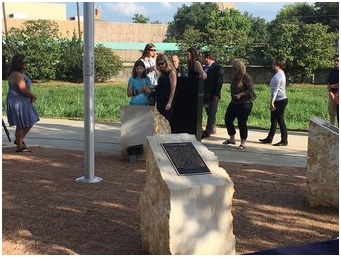
When I meet new people, which is not one of my favorite activities, I’m often asked what was the hardest story I’ve ever covered. I don’t have a good answer to that, but in order to silence the complete bore who cornered me at a party, I usually ramble through a long list items.

For instance, I was in Houston during Hurricane Ike. An associate was kind enough to send a picture he’d found of me kneeling and frowning in front of the former presidents.
Even though I grew up in Ohio and went to college in Indiana, the first time I saw a tornado was, ironically, in Portland, Oregon. I was covering a news conference at the airport about something when my news director called. He told me a tornado was on the ground in Vancouver, Washington, right across the river.
So I got on Interstate 205 and spotted the thing, clear as day, right in front of me. We were in continuous coverage, so I called my newsroom to do a live report.
“OH MY GOD,” I explained.
There are other stories that stick out, like the PK wildfires a few years ago, the pope’s visit to Mexico last year and the lighter ones, like the time a terrified Alan Scaia rappelled down a building.
While there’s no one stand-out, the July 7 police shooting last year will be one of those memorable ones.
That night, we were also in continuous coverage. For a while, it was our anchor, Eric Bushman, and me going back and forth about how I couldn’t get into downtown because every exit was blocked off.
At the time, we didn’t know exactly what was happening or how many officers had been shot, but shutting down access to the center of a city of more than a million people was a clear signal to both of us.
I finally made it to a 7-Eleven a few blocks away. People were streaming out of downtown by that time, and I walked up to a police officer on the street.

Usually, when a reporter walks up to an officer, he’ll just gesture toward the “staging area” to show me where media should set up or say he doesn’t know what’s going on.
In this case, though, the officer looked legitimately frazzled as he told me he didn’t know what was going on and said radio traffic was all over the place. This is the first time a police officer had ever asked me to let him know if I heard anything.
A few hours in, my program director called and suggested I head toward Dallas City Hall. There, the mayor and police chief would start giving updates.
Dallas City Hall is only about a mile from that 7-Eleven, but it’s on the other side of downtown.
“I’ll be there in 12 hours,” I explained. “I’ll just need to head out to Lubbock and do a U-turn to get around the closures.”
The following morning, once everything had calmed down in Dallas, I talked to the police chief in Ft. Worth. Ft. Worth police had just graduated a class of cadets. I asked if the shooting the night before could turn off some young officers to the idea of making a career out of law enforcement.
Joel Fitzgerald explained that would not be the case. He said the department hammers home to recruits that any day is a day they might not make it home.
That seemed to me like a very honest and straightforward answer that also happened to be incredibly disappointing.

Yesterday, I started covering memorials for the officers who were killed.
The chiefs of both Dallas and DART police said the monuments and memorials might remind them of that night, but the support they’ve been getting from the community has helped officers recover.
So listen, Scaiaholics, I’m not going to micromanage and tell you what kind of pie to bake and deliver to your local police station…